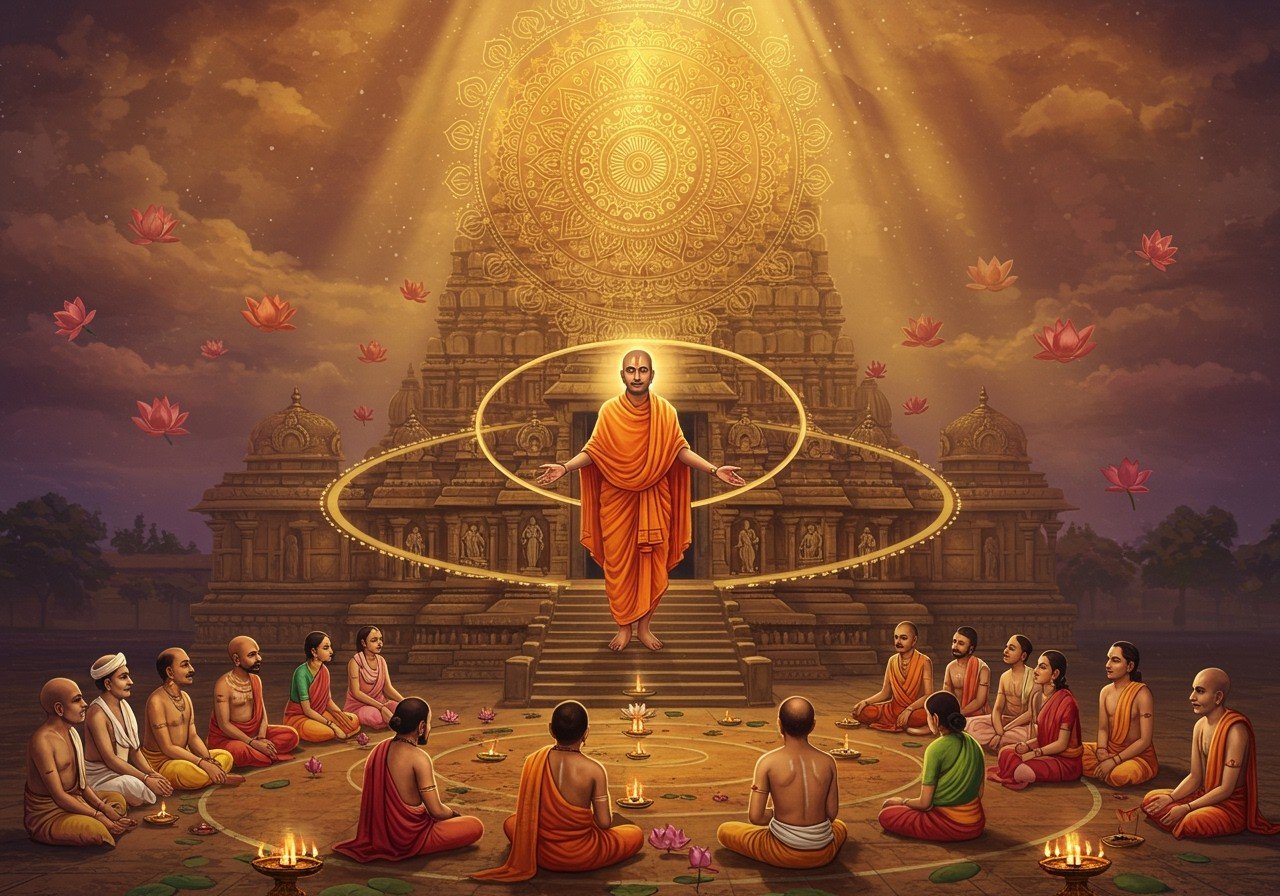
Understanding the teachings of Ramanuja provides insight into a harmonious blend of tradition and equality. As a revered Indian philosopher, Ramanuja offered perspectives on caste that challenged societal norms of his time. His teachings resonate deeply with those who value tradition while seeking equality. Explore our collection of spiritual products at poojn.in.
Ramanuja’s Historical Context and Life
In 11th-century India, society was marked by strict caste systems. Ramanuja (c. 1017-1137 CE), born into this environment, embarked on a spiritual journey, becoming a prominent philosopher. Influenced by Vaishnavism, Ramanuja played a significant role in the Bhakti movement, prioritizing devotion over rituals. His interpretations of the Vedas and Upanishads differed from earlier scholars like Shankaracharya, focusing on inclusivity and devotion. You can find resources related to Vaishnavism at poojn.in.
Ramanuja’s Teachings on Caste
Ramanuja viewed the caste system through a lens of spiritual equality, not social hierarchy. He believed in the inclusivity of all castes in spiritual practices, challenging Brahminical exclusivity. Ramanuja emphasized ‘Prapatti,’ or surrender to God, open to everyone regardless of caste. This focus on devotion and inner purity was revolutionary, moving away from birth-based distinctions. Discover more about Bhakti traditions at poojn.in.
Ramanuja on Equality and Social Harmony
Ramanuja taught that all beings are equal reflections of the divine. His philosophy promoted social harmony through a community united by devotion, not divided by caste. ‘Sahishnuta,’ or tolerance, encouraged acceptance and coexistence. Ramanuja’s initiatives included marginalized communities in religious activities, paving the way for a more egalitarian society. Find puja items for your spiritual practices at poojn.in.
Impact of Ramanuja’s Teachings in Contemporary Society
Ramanuja’s teachings continue to influence modern Indian society, particularly among those valuing cultural heritage and social justice. His principles are integrated into contemporary religious practices, resonating with current social reform movements. Communities and temples inspired by Ramanuja promote inclusivity and social welfare. Enhance your understanding with resources available at poojn.in.
Critiques and Interpretations
Scholars offer various interpretations of Ramanuja’s teachings on caste and equality. Some critiques question the practicality of his ideas then and now. Different Vaishnavism sects have adopted or adapted his teachings, keeping his vision relevant in today’s theological discussions. Delve deeper into these discussions with related articles at poojn.in.
Ramanuja’s Influence on Caste and Equality
In 11th-century India, Ramanuja emerged as a beacon of change. He challenged the status quo, inspired by the Alvars. He pushed against caste discrimination, welcoming “untouchables” into the Sri Vaishnava Bhakti Movement. This was a revolutionary act, demonstrating his commitment to inclusivity. Learn more about the Bhakti movement at poojn.in.
Inclusivity in Devotion
Ramanuja taught that devotion was for everyone, believing deeply in spiritual equality. He opened temple doors to all devotees, a significant shift from traditional practices. Accepting disciples from various castes demonstrated his commitment to equality. Find idols for your personal worship at poojn.in.
Social Reform and Temple Practices
He included all social groups in temple rituals. In Melukote, he called the marginalized “Tirukulattar,” meaning “of noble descent.” This renaming was a profound gesture. Ramanuja’s reforms in Srirangam brought non-Brahmins into Vaishnava worship, enriching diversity. Discover puja items for your spiritual practices at poojn.in.
Accessible Teachings
Ramanuja’s teachings reached a wide audience, spreading the Bhakti movement across South India. He included devotional songs by lower-caste Tamil saints in temple rituals, elevating their social standing. This gave them a voice within religious spaces. Explore our diverse collection at poojn.in.
Emphasis on Character
He judged individuals by character, not birth caste. This challenged societal norms and encouraged harmony. His “Sharanaagathi” teachings promised salvation for all, regardless of societal labels. Find spiritual resources to support your journey at poojn.in.
Diverse Interpretations
Interpretations vary. Some suggest Ramanuja limited Vedic studies for Shudras but embraced the Divya Prabandham (Dravida Veda), accessible to all. This showcased his intent to spread spiritual knowledge. Enhance your understanding with our collection of sacred texts at poojn.in.
Ramanuja’s teachings inspire those who cherish tradition and aspire for equality. His efforts created an inclusive spiritual community, impacting generations. Explore our range of products at Poojn.in to support your spiritual journey.


